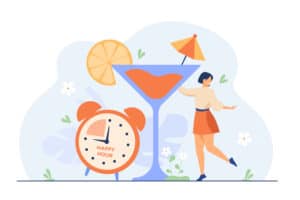
There is a lot of really great information and tips out there to improve your sleep quality. The information is often very easy to find – just run on over to google and type “how to improve my sleep” and voila! Hundreds of articles will appear at the tips of your fingers!
But WAIT! There are a lot of sleep “tips” on the internet that have actually been disproven.
No matter how much you believe these “tips” may be helping you, there is an excess of research pointing to the detrimental impact that many of these sleep myths have on your slumber.
Now, are you ready to put these sleep myths to bed?
MYTH: A warm room will provide a night of comfier and better quality sleep.
Who doesn’t love to be warm and cozy? If you’re thinking you will get the best quality sleep in a cozy, warm environment, you’re not alone. But you’re also wrong. Researchers have found that the physical process of sleep includes a temperature drop in the body and a warm bedroom can disrupt that process.
FACT: Sleeping in a room with a cooler temperature will give you a better quality of sleep.
Try setting the temperature in your bedroom to 65℉ (18.3℃) to achieve the best quality of sleep.
MYTH: You need 8 hours of sleep every night.
“I gotta get my 8 hours” – I bet this is something you’ve heard since you were just a kid, but the amount of hours of sleep you should get at night is variable and depends on a number of factors, such as your age group.
FACT: There is no magic number for the ideal quantity of sleep.
The quantity of your sleep is not as important as the quality of your sleep. Everyone has a different “need for sleep” which may sometimes vary depending on what’s going on in your life.
MYTH: Bedtime routines are just for kids.
You may remember fondly your bedtime ritual from childhood. Perhaps it was a warm bath, followed by brushing your teeth, changing into your pajamas, and then snuggling under the covers and hearing a soothing bedtime story. It brings back feelings of nostalgia, doesn’t it? Well, the brain you had as a child that associated these activities with sleep is the same brain you have now, so it shouldn’t be too farfetched to think that a bedtime routine will help you as an adult, too.
FACT: Bedtime routines improve sleep for all ages.
Using a bedtime routine in adulthood helps regulate your sleep-wake cycle, eases anxiety, and whisks you off to sleep more quickly. Learn more about how to build a bedtime routine that will improve your sleep.
MYTH: Alcohol makes you sleep more soundly
Do you ever have a drink before bed just to help you wind down? Sure, a nightcap will make you drowsy but it turns on you in the second half of the night. This is known as the “rebound effect” and it’s actually an enemy of sleep.
FACT: Alcohol ruins sleep more than you think.
Alcohol’s sedative effect means you fall into deep sleep more quickly, which creates an imbalanced sleep cycle. As your body metabolizes alcohol, your brain responds to this disruption by blasting an excitatory chemical messenger called glutamate. Excitatory chemicals aren’t exactly helpful for sleep. Alcohol can also make you a really annoying bedmate since it’s known to exacerbate snoring and can cause more frequent nightly bathroom breaks. Learn more about how alcohol wreaks havoc on sleep.
MYTH: You need less sleep as you get older
This is one of the most popular myths out there. Sure, children have slightly different sleep needs, and some changes that occur as our bodies get older can make getting a full night’s sleep more difficult, but once you enter adulthood your sleep patterns shouldn’t really change too much.
FACT: Adults of all ages have the same sleep needs.
Whether you’re 22 or 92, it’s recommended that you get around 7-8 hours of sleep per night.
MYTH: Dreaming only happens during REM sleep.
Everyone dreams; and everyone who learns about dreaming will find out that REM sleep is where your dreams will occur. Well, it’s actually where your most intense dreams are most likely to occur, but FUN FACT! Dreaming can actually occur during any of your sleep stages!
FACT: Dreaming can occur during all of you sleep stages.
Interestingly, researchers have found that different content occurs in REM vs. non-REM sleep!
MYTH: You slept well if you can remember your dreams.
It’s exciting, isn’t it? When you wake up and can remember the details of a really neat dream. If you think it’s indicative that you got a great sleep, you might be surprised to learn that people who remember their dreams may actually be getting less sleep. Researchers found that individuals who remembered their dreams had a more fragmented sleep than individuals who did not remember their dreams. Your brain is not wired to remember dreams and it’s completely normal to forget all of them.
FACT: Dreaming cannot be used as a measure of sleep quality, unfortunately.
When you vividly remember a dream, it’s likely just because you woke up during or directly after REM sleep so the dream has not yet faded.
MYTH: Daytime sleepiness means you're not getting enough sleep at night.
Sure, if you got a crappy sleep at night, you’re probably feeling sleepy the next day. It makes sense that if you’re not sleeping well at night, you’ll be more tired during the day. But don’t be so quick to lay all the blame on your sleep quality because the real perp might just go unnoticed.
FACT: There are many different factors, besides not getting enough sleep at night, that can cause daytime sleepiness
Poor diet, stress, underlying medical issues, as well as sleep disorders (such as narcolepsy or sleep apnea) can cause excessive daytime sleepiness.
MYTH: Napping during the day will make up for missed nighttime sleep.
Naps are popular, but there’s a right way and a wrong way to nap. One of the most common misconceptions about naps is that they can make up for lost sleep. Sure, a nap can leave you feeling reenergized, but they are just a short-term solution. Napping isn’t a substitute for a good night’s sleep and can even be disruptive to your sleep patterns, leading to health problems.
FACT: Fortunately, you can incorporate naps in a way that boosts your health without disrupting your sleep at night.
Aim to schedule your nap between 1-3 pm (when your body experiences a natural lull in energy levels) and sleep no longer than 20 minutes. Learn more about how to nap strategically to better your sleep and your health!
MYTH: You can catch up on sleep on the weekend.
If you’re shouting “TGIF!” because you’re looking forward to spending your weekend catching up on all that missed sleep after a busy week, I’m sorry but I have bad news for you. A 2016 study found that it takes four full days to fully recover from one hour of lost sleep. Yikes, too bad your weekend is only 2 days long.
FACT: Missing an hour or two of sleep here and there won’t have a drastic impact on your health.
However, if you keep doing it, over time you will create sleep debt. Sleep debt has a high-interest rate that’s compounding. This means that regularly missing sleep and pushing sleep schedules can take a serious toll on your health. Weekend schedule disruptions can also lead to a condition called social jet lag. It’s sort of like regular jet lag except instead of traveling you stayed up late sipping margaritas.
MYTH: Your body will get used to getting less sleep at night.
After a few nights of insufficient sleep, you’re most likely to experience daytime sleepiness. Over time, this symptom will reduce, leading people to believe they’ve “adjusted” to getting less sleep. However, research has shown that sleep loss takes a significant toll on your brain, body, and mind.
FACT: Regularly getting less sleep will lead to sleep deprivation.
Sleep deprivation wreaks havoc on your heart health, immune system, hormone production, and metabolism. It also makes it more difficult to store memories, think creatively, focus, and make decisions. You aren’t functioning anywhere near your optimal level. Nobody truly adjusts to less sleep. It’s a bummer.
MYTH: Hitting snooze provides you with extra rest.
“Just five more minutes” is a phrase commonly heard across the world in the morning. Hitting snooze is the easiest way to give yourself a few more minutes of sleep, but those few minutes of extra rest are not going to be restorative.
FACT: Snoozing your alarm is more likely to make you feel worse.
When your alarm goes off, it springs you out of your sleep cycle. But when you hit snooze and try to doze back off, your sleep cycle actually resets. Your extra snooze is going to be very fragmented and anything but restful.






